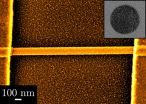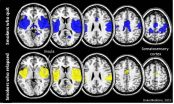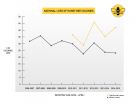Astrology and celebrity: Seasons really do influence personality
A statistical analysis of birth month and celebrity finds that individuals born under certain astrological signs are more likely to become famous
2015-05-13
(Press-News.org) People's personalities tend to vary somewhat depending on the season in which they are born, and astrological signs may have developed as a useful system for remembering these patterns, according to an analysis by UConn researcher Mark Hamilton. Such seasonal effects may not be clear in individuals, but can be discerned through averaging personality traits across large cohorts born at the same time of year. Hamilton's analysis will be published in Comprehensive Psychology on 13 May.
Psychologists have known that certain personality traits tend to be associated with certain birth months. For example, people born in January and February tend to be more creative, and have a higher chance of being diagnosed with schizophrenia, than people born at any other time of year. And people born in odd-numbered months tend to be more extroverted than those born in even-numbered months.
Traditional Western astrology uses elements (water, earth, air and fire), sign duality (bright/dark) and sign qualities (cardinal, mutable and fixed) to describe and categorize these effects. It considers late December through early March as a "wet" time of year, and connects wetness with creativity, for example. "Fixed" signs are said to be more stubborn and persistent than others.
Hamilton looked at a data set of 300 celebrities from the fields of politics, science, public service, literature, the arts and sports. He found that celebrities' birth dates tended to cluster at certain times of the year. 'Wet' signs were associated with more celebrities, as were signs classified as 'bright' and 'fixed'.
"Psychologists want to dismiss these astrological correlations, but there are seasonality effects that we have yet to explain," says Hamilton, a social scientist in the Communication Department at UConn. Hamilton is not arguing that heavenly bodies are the true source of these effects; rather, astrological aspects are just useful tools, or heuristics, that help people remember the timing and patterns of nature.
Hamilton is currently working with other researchers on an analysis of 85,000 celebrities dating from 3,000 B.C.E to the present era. He says that the seasonality effect on celebrity appears to hold true even in this large data set stretching across millennia and cultures.
INFORMATION:
ELSE PRESS RELEASES FROM THIS DATE:
2015-05-13
This news release is available in Japanese.
Pollutants emitted by factories and car exhausts affect humans who breathe in these harmful gases and also aggravate climate change up in the atmosphere. Being able to detect such emissions is a critically needed measure.
New research by the Nanoparticles by Design Unit at the Okinawa Institute of Science and Technology Graduate University (OIST), in collaboration with the Materials Center Leoben Austria and the Austrian Centre for Electron Microscopy and Nanoanalysis has developed an efficient way to improve methods ...
2015-05-13
(Boston)--In the largest study to date that examines Post Traumatic Stress Disorder (PTSD) as a risk factor for cancer, researchers from Boston University School of Medicine (BUSM), have shown no evidence of an association.
The study, which appears in the European Journal of Epidemiology, is consistent with other population-based studies that report stressful life events generally are not associated with cancer incidence. In addition to corroborating results of other studies, this large population sample allowed for important stratified analyses that showed no strong ...
2015-05-13
Our bodies' hormones work together to tell us when to eat and when to stop. But for many people who are obese, this system is off-balance. Now scientists have designed a hormone-like compound to suppress hunger and boost satiety, or a full feeling, at the same time. They report in ACS' Journal of Medicinal Chemistry that obese mice given the compound for 14 days had a tendency to eat less than the other groups.
In their study, Constance Chollet and colleagues targeted two main receptors in the body that help keep appetite in check. When hormones bind to ghrelin receptors, ...
2015-05-13
WASHINGTON, D.C., May 13, 2015--Policymakers and practitioners have grown increasingly interested in measures of personal qualities other than cognitive ability--including self-control, grit, growth mindset, gratitude, purpose, emotional intelligence, and other beneficial personal qualities--that lead to student success. However, they need to move cautiously before using existing measures to evaluate educators, programs, and policies, or diagnosing children as having "non-cognitive" deficits, according to a review by Angela L. Duckworth and David Scott Yeager published ...
2015-05-13
Coffee has gone from dietary foe to friend in recent years, partly due to the revelation that it's rich in antioxidants. Now even spent coffee-grounds are gaining attention for being chock-full of these compounds, which have potential health benefits. In ACS' Journal of Agricultural and Food Chemistry, researchers explain how to extract antioxidants from the grounds. They then determined just how concentrated the antioxidants are.
María-Paz de Peña and colleagues note that coffee -- one of the most popular drinks in the world -- is a rich source of a group ...
2015-05-13
Several class-action lawsuits filed recently against the makers of flushable wet-wipes have brought to light a serious -- and unsavory -- problem: The popular cleaning products might be clogging sewer systems. But whether the manufacturers should be held accountable is still up in the air, according to an article in Chemical & Engineering News (C&EN), the weekly newsmagazine of the American Chemical Society.
Jessica Morrison, assistant editor at C&EN, reports that New York City alone claims to have spent more than $18 million over six years clearing wipes from its wastewater ...
2015-05-13
Rats have more heart than you might think. When one is drowning, another will put out a helping paw to rescue its mate. This is especially true for rats that previously had a watery near-death experience, says Nobuya Sato and colleagues of the Kwansei Gakuin University in Japan. Their findings are published in Springer's journal Animal Cognition.
Recent research has shown that a rat will help members of its own species to escape from a tubelike cage. The helping rat will show such prosocial behavior even if it does not gain any advantage from it. To see whether these ...
2015-05-13
DURHAM, N.C. - Smokers who are able to quit might actually be hard-wired for success, according to a study from Duke Medicine.
The study, published in Neuropsychopharmacology, showed greater connectivity among certain brain regions in people who successfully quit smoking compared to those who tried and failed.
The researchers analyzed MRI scans of 85 people taken one month before they attempted to quit. All participants stopped smoking and the researchers tracked their progress for 10 weeks. Forty-one participants relapsed. Looking back at the brain scans of the 44 ...
2015-05-13
Beekeepers across the United States lost more than 40 percent of their honey bee colonies during the year spanning April 2014 to April 2015, according to the latest results of an annual nationwide survey. While winter loss rates improved slightly compared to last year, summer losses--and consequently, total annual losses--were more severe. Commercial beekeepers were hit particularly hard by the high rate of summer losses, which outstripped winter losses for the first time in five years, stoking concerns over the long-term trend of poor health in honey bee colonies.
The ...
2015-05-13
MANHASSET, NY -- The Feinstein Institute for Medical Research, the research arm of the North Shore-LIJ Health System, and SetPoint Medical Inc., a biomedical technology company, today released the results of research on the therapeutic potential of vagus nerve stimulation. In a paper published by Bioelectronic Medicine, Kevin J. Tracey, MD, and his colleagues at the Feinstein Institute, explore how low-level electrical stimulation interacts with the body's nerves to reduce inflammation, a fundamental goal of bioelectronic medicine.
Prior to this study, it was not understood ...
LAST 30 PRESS RELEASES:
[Press-News.org] Astrology and celebrity: Seasons really do influence personality
A statistical analysis of birth month and celebrity finds that individuals born under certain astrological signs are more likely to become famous



